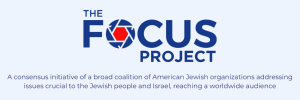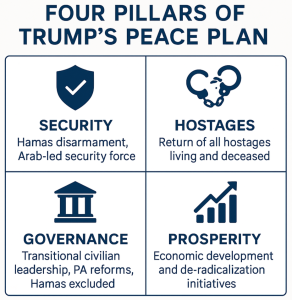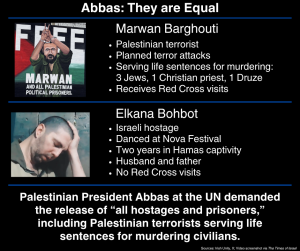
September 30, 2025
STAY INFORMED – TALKING POINTS – ACTIONS TO CONSIDER – STORIES MAKING NEWS
![]()

The war in Gaza has entered a pivotal moment. For decades, American and Israeli peace efforts have been met with rejection and violence. A new U.S. proposal now puts an ultimatum on the table: will Hamas accept reform and coexistence – or continue the war it started?
20-Point Peace Plan: Hamas Must Choose Peace or Terror
President Trump presented a plan to end the Gaza war at a joint news conference with Israeli Prime Minister Netanyahu at the White House. The plan includes:
The plan now depends on the reaction of Hamas. The Iran-backed terror group would be required to end its rule of Gaza, relinquish its weapons and agree to peace with Israel. Only hours before the White House meeting, Hamas launched two rockets at Israel. They fell short, landing in Gaza.
The Palestinian Center for Policy and Survey Research revealed in May that 77% of Palestinians opposed Hamas disarmament as a condition for ending the war and most doubted that it would end the war. The same poll also showed declining support for Hamas and the Oct. 7 attacks, though still remaining high.
Leaders around the world, including Arab nations, European countries and the Palestinian Authority welcomed the proposals. The foreign ministers of Saudi Arabia, Jordan, the UAE, Indonesia, Pakistan, Turkey, Qatar and Egypt supported the plan: “We welcome President Trump’s leadership and his sincere efforts to end the war in Gaza.”
If Hamas does not comply, President Trump asserted that “Israel would have my full backing to finish the job of destroying the threat of Hamas.” The terror group is reviewing the proposal – President Trump’s stated deadline for a response is Oct. 3. Iran-backed Palestinian Islamic Jihad – which holds at least one Israeli hostage – condemned the plan.

The PA, Israel and Qatar: Peace Partners?
The Palestinian Authority also must accept significant reforms rejected for decades, including an end to incitement in schools, media and mosques it controls. The UN runs most Palestinian schools. A recent report revealed how UNRWA allowed Hamas chiefs to control its education system in Gaza and Lebanon. The PA accepted Trump’s proposal.
If the plan is approved but the Israeli government does not fully implement all elements, it will face international pressure. Netanyahu declared his opposition to a Palestinian state at the UN the week before. After the Oct. 7 atrocities, a majority of Israelis opposed Palestinian statehood in the immediate future. Netanyahu’s hardline allies are likely to resist any steps that could advance Palestinian statehood, even if the plan does not require Israel to accept it immediately.
Qatar continues to play a strategic role. The country hosts Hamas leaders and acts as an intermediary for Israel in negotiations. The Israeli Air Force recently targeted a Hamas meeting in Qatar that also killed a national security officer. In a call from the White House, Netanyahu expressed regret for the loss of life, but stressed that Israel’s target was Hamas terrorists.
The small country wields enormous influence. Qatar controls Al-Jazeera media channels, contributes billions to American universities and is leading the fight to ban Israeli teams from European soccer competitions. Seven Arab countries, including Saudi Arabia, cut ties with Qatar in 2017 because of its support for terrorism and demanded Qatar shut down Al-Jazeera. The network has banned any criticism of Hamas during the Gaza war.
Historical Rejections of Peace: ‘No negotiations’
Israelis have tried for decades to achieve a two-state solution. Palestinian and Arab leaders have consistently rejected co-existence. Arab countries launched wars of annihilation against the Jewish state in 1948, 1967 and 1973. Israel captured the West Bank from Jordan, Gaza from Egypt and the Golan from Syria in 1967’s Six-Day War. Israel offered to return the land for peace, but the Arab League responded with the “Three No’s” – No peace, no recognition and no negotiations.
Palestinian Authority President Mahmoud Abbas – serving the 20th-year of his 4-year term – asserted again at the UN that the Palestinians will hold elections within a year. His speech equated Israeli hostages with imprisoned Palestinian terrorists, wore a pin symbolizing the destruction of Israel – and has still not condemned the Oct. 7 attacks in Arabic to Palestinians.
If elections were held now, it is estimated that about two-thirds of Palestinians – in the West Bank and Gaza – would vote for Hamas in parliamentary elections. According to a 2025 survey, only 33% of Palestinians support negotiations with Israel. Also, 41% support “armed struggle” – terrorism, including 50% who think the Oct. 7 attacks were a good decision.

Recognizing Palestine: ‘Oct. 7 benefited Palestinians’
France recently led a group of nations, including Australia, Canada and the UK, recognizing Palestine as a state at the annual UN General Assembly. Of the 193 UN member states, 156 have recognized the State of Palestine since 1988. Many Israelis and Jews see this as a reward for Palestinians after Oct. 7. Franco-Israelis slammed French President Macron for “encouraging more bloodshed.”
Macron’s initiative ignored core obstacles to peace, including the Palestinian rejection of the “right of return” that would end Israel’s existence as a Jewish state. For many anti-Israel activists, recognition of Palestine does not mean reconciliation – it simply advances Israel’s elimination.
A Qatar-based Hamas leader recently admitted that Gazans are paying “a high price” in the war – but that Oct. 7 created “a golden moment” benefitting Palestinians. He falsely claimed that the Israeli hostages are being treated according to “Islamic principles.” A senior Palestinian Authority leader declared that the recognition was “the result of more than a century of resistance.”
![]()

![]()

Contact your U.S. Representative and Senators to promote real peace and hold Palestinian leaders accountable. Here are four priorities to raise:
![]()

Stories Impacting American Jews
Stories Impacting the U.S. and Israel
Stories from Around the World
Stay Informed | Speak Up | Take Action
Want to Read More of Our Talking Points? Did you miss a recent edition of The Focus Project? No need to search your inbox. Our most recently published editions are available on our website.
![]()

This content is developed by The Focus Project in partnership with MERCAZ USA. The Focus Project distributes weekly news and talking points on timely issues concerning Israel and the Jewish people, including antisemitism, anti-Zionism and the delegitimization of Israel. It represents a consensus view across a spectrum of major American Jewish organizations. MERCAZ USA recognizes and respects the diversity of views on these issues among its readers and the community at large.